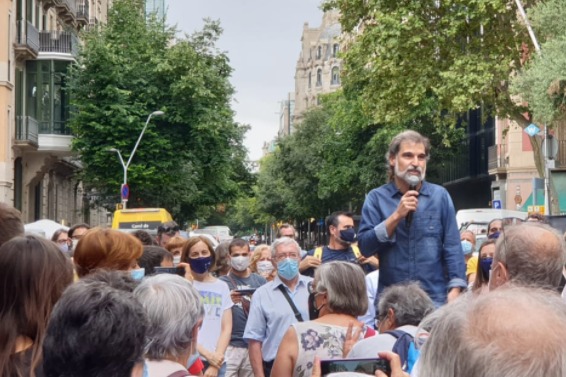09.06.2021 - 14:36
|
Actualització: 09.06.2021 - 16:36
The activist Jordi Cuixart has become the first Catalan political prisoner to take his case to the European Court of Human Rights in Strasbourg. The president of the civic organization Òmnium Cultural is serving a 9-year prison sentence for sedition after leading a protest on 20 September 2017 in the buildup to the 1 October 2017 referendum. He spent two years in pre-trial detention before the Supreme Court convicted him on 14 October 2019.
Òmnium will explain the content of Cuixart’s appeal in depth next Tuesday alongside various international organizations, but they have already explained that it has been filed in Catalan and includes around 60 reports of entities that have called for his release. For instance, Amnesty International has repeatedly called for his release since his imprisonment, stating shortly after his conviction that it was an “excessive and disproportionate punishment for actions that resulted from the exercise of the rights to freedom of expression and peaceful assembly.” The United Nations Working Group on Arbitrary Detention has also repeatedly called for the release of all jailed leaders.
2,009-page appeal
Òmnium posted a picture of the 2,009 pages of their appeal outside the court in Strasbourg with the message: “Spain, we see each other in Europe!”
📸 L'endemà de conèixer la resolució del TC i les escletxes que representen els dos vots particulars, presentem el recurs de @jcuixart davant el Tribunal Europeu de Drets Humans a Estrasburg 🇪🇺
Espanya, ens veiem a Europa! 👋 pic.twitter.com/sCBA1zXTgp
— Òmnium Cultural (@omnium) June 9, 2021
Catalonia’s public broadcaster TV3 broke the news, and soon afterwards Òmnium explained that Cuixart’s legal team has placed the appeal in person on Wednesday morning.
Cuixart’s case
Jordi Cuixart took his case before the European Court of Human Rights soon after Spain’s Constitutional Court rejected his last appeal within the Spanish judiciary. Indeed, he did it the day after the reasons of the magistrates’ decision were made public. The activist was convicted for leading protests during the 2017 independence push, in particular, outside the Catalan economy ministry on 20 September 2017 while Spanish police were raiding the building, aiming to undo the frameworks of the referendum that not authorized by Spain but that ended up taking place.
Cuixart stood on a car with a megaphone in the evening in order to call off the event, which ended without no injuries or arrests. Yet, both the Supreme Court and Constitutional Court called that demonstration “tumultuous” and said that Cuixart’s acts “were not within the legitimate freedom of speech and assembly.” The magistrates considered that he had not been convicted for organizing rallies, but for “accepting and calling for people to not abide by the constitution.”
Disproportionate conviction
Yet, two judges in the Constitutional Court disagreed with the ruling of the majority, arguing that the sentencing is “disproportionate.” Juan Antonio Xiol and Maria Luisa Balaguer said that the decision “should have been made more in accordance with an updated interpretation and in accordance with the European Court of Human Rights. They both agreed that Cuixart’s imprisonment is an “interference” to his right of assembly.
In his closing remarks in the trial, as well as in the first cross-examination, Cuixart defended the right to protest for self-determination, whatever the outcome of the trial. “If police violence could not stop thousands of people from voting in the referendum, does anyone believe that a sentence will cause Catalans to stop fighting for their rights?” he said. Right before the proceedings ended, he famously said in court: “We will do it again.”


